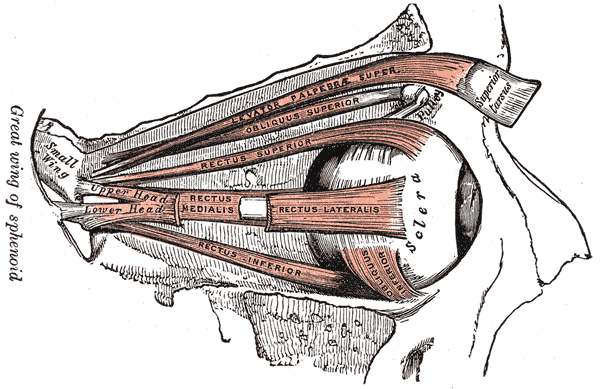Phantom eye syndrome
Editor-In-Chief: Prab R Tumpati, MD
Obesity, Sleep & Internal medicine
Founder, WikiMD Wellnesspedia &
W8MD medical weight loss NYC and sleep center NYC
| Phantom eye syndrome | |
|---|---|

| |
| Synonyms | N/A |
| Pronounce | N/A |
| Specialty | N/A |
| Symptoms | Phantom pain, visual hallucinations, dry eye |
| Complications | Depression, anxiety |
| Onset | After enucleation or eye removal surgery |
| Duration | Can be chronic |
| Types | N/A |
| Causes | Nerve damage, psychological factors |
| Risks | Eye cancer, severe eye trauma |
| Diagnosis | Clinical diagnosis |
| Differential diagnosis | Phantom limb syndrome, Charles Bonnet syndrome |
| Prevention | N/A |
| Treatment | Pain management, counseling, antidepressants |
| Medication | N/A |
| Prognosis | N/A |
| Frequency | Common in patients post-enucleation |
| Deaths | N/A |
A condition involving sensations in an absent eye
Phantom Eye Syndrome (PES) is a condition that occurs in individuals who have undergone enucleation, the surgical removal of an eye. It is characterized by the sensation that the removed eye is still present and functioning. This phenomenon is similar to phantom limb syndrome, where amputees feel sensations in a limb that is no longer there.
Symptoms
Patients with Phantom Eye Syndrome may experience a variety of sensations, including:
- Visual hallucinations
- Pain or discomfort in the area of the removed eye
- Itching or tingling sensations
- The feeling of movement or pressure
These symptoms can vary in intensity and duration, and they may persist for months or even years after the enucleation.
Causes
The exact cause of Phantom Eye Syndrome is not fully understood, but it is believed to be related to the neuroplasticity of the brain. After the removal of an eye, the brain may continue to receive signals from the optic nerve or other neural pathways that were associated with the eye. This can lead to the perception of sensations that seem to originate from the absent eye.
Diagnosis
Diagnosis of Phantom Eye Syndrome is primarily based on the patient's reported symptoms. A thorough medical history and physical examination are conducted to rule out other potential causes of the symptoms. In some cases, imaging studies may be used to assess the condition of the orbit and surrounding structures.
Treatment
There is no specific treatment for Phantom Eye Syndrome, but several approaches may help alleviate symptoms:
- Pain management techniques, including medications such as analgesics or antidepressants
- Cognitive behavioral therapy (CBT) to help patients cope with the sensations
- Mirror therapy, which has been used successfully in treating phantom limb pain
Prognosis
The prognosis for individuals with Phantom Eye Syndrome varies. Some patients may experience a reduction in symptoms over time, while others may continue to have persistent sensations. Ongoing research is aimed at better understanding the condition and developing more effective treatments.
See also
Transform your life with W8MD's budget GLP-1 injections from $125.
W8MD offers a medical weight loss program to lose weight in Philadelphia. Our physician-supervised medical weight loss provides:
- Most insurances accepted or discounted self-pay rates. We will obtain insurance prior authorizations if needed.
- Generic GLP1 weight loss injections from $125 for the starting dose.
- Also offer prescription weight loss medications including Phentermine, Qsymia, Diethylpropion, Contrave etc.
NYC weight loss doctor appointments
Start your NYC weight loss journey today at our NYC medical weight loss and Philadelphia medical weight loss clinics.
- Call 718-946-5500 to lose weight in NYC or for medical weight loss in Philadelphia 215-676-2334.
- Tags:NYC medical weight loss, Philadelphia lose weight Zepbound NYC, Budget GLP1 weight loss injections, Wegovy Philadelphia, Wegovy NYC, Philadelphia medical weight loss, Brookly weight loss and Wegovy NYC
|
WikiMD's Wellness Encyclopedia |
| Let Food Be Thy Medicine Medicine Thy Food - Hippocrates |
Medical Disclaimer: WikiMD is not a substitute for professional medical advice. The information on WikiMD is provided as an information resource only, may be incorrect, outdated or misleading, and is not to be used or relied on for any diagnostic or treatment purposes. Please consult your health care provider before making any healthcare decisions or for guidance about a specific medical condition. WikiMD expressly disclaims responsibility, and shall have no liability, for any damages, loss, injury, or liability whatsoever suffered as a result of your reliance on the information contained in this site. By visiting this site you agree to the foregoing terms and conditions, which may from time to time be changed or supplemented by WikiMD. If you do not agree to the foregoing terms and conditions, you should not enter or use this site. See full disclaimer.
Credits:Most images are courtesy of Wikimedia commons, and templates, categories Wikipedia, licensed under CC BY SA or similar.
Contributors: Prab R. Tumpati, MD

